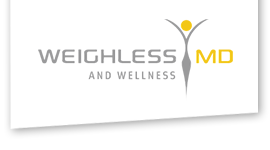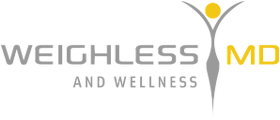Losing Weight While Maintaining Muscle Mass In Brookfield WI
Losing Weight While Maintaining Muscle Mass in Brookfield WI

Losing weight while simultaneously building or maintaining muscle mass takes focus yet an achievable goal that requires a strategic approach. By following these key principles, you can work towards achieving your desired body composition effectively:
- Calorie Deficit with Adequate Protein Intake: Ensure that you maintain an adequate protein intake to support muscle growth and repair. Aim for around 1.2-2.2 grams of protein per kilogram of body weight. The calorie deficit is individualized based on each person and we can help you with that at Weighless MD - Brookfield.
- Resistance Training: Incorporate strength training exercises into your workout routine. Resistance training helps preserve muscle mass while in a calorie deficit and can even promote muscle growth. Focus on compound movements like squats, deadlifts, bench presses, and rows.
- Progressive Overload: Continuously challenge your muscles by gradually increasing the weight, reps, or sets in your workouts. This progressive overload is essential for muscle growth and strength development.
- Cardiovascular Exercise: Include cardiovascular exercise in your routine to support weight loss. However, be mindful not to overdo it, as excessive cardio can potentially hinder muscle growth. High-intensity interval training (HIIT) is a great option as it can help burn fat while preserving muscle mass.
- Adequate Rest and Recovery: Getting enough rest is crucial for muscle recovery and growth. Aim for 7-9 hours of quality sleep per night and allow your muscles time to recover between intense workouts.
- Nutrient-Dense Diet: Focus on consuming nutrient-dense foods that support both weight loss and muscle maintenance. Incorporate a variety of fruits, vegetables, whole grains, lean proteins, and healthy fats into your meals.
- Stay Hydrated: Proper hydration is essential for overall health and optimal muscle function. Drink an adequate amount of water throughout the day, especially before, during, and after workouts.
- Monitor Progress: Track your progress by regularly taking measurements, assessing body fat percentage, and monitoring strength gains. Adjust your routine as needed to ensure you are effectively losing weight while maintaining muscle mass.
Remember, this process requires patience, consistency, and dedication. Consult with a fitness professional or a nutritionist to tailor a plan specifically to your individual goals and needs. With the right approach, you can achieve your desired body composition successfully.
Ensure You Are Consuming Enough Protein in Brookfield WI
Protein is a crucial component of building and maintaining muscle mass while losing weight. Lean animal source protein and plant-based protein are both excellent options to fulfill your protein requirements. Here’s how you can incorporate these sources into your diet effectively:
Lean Animal Source Protein:
- Chicken Breast: Chicken breast is a popular choice for its high protein content and low-fat content. It can be easily incorporated into various meals like salads, stir-fries, and wraps.
- Turkey: Turkey is another lean protein source that is rich in nutrients like iron and B vitamins. Ground turkey or turkey breast can be used in dishes like chili, tacos, or sandwiches.
- Fish: Fatty fish such as salmon, tuna, and mackerel are not only high in protein but also provide essential omega-3 fatty acids. These nutrients support muscle health and overall well-being.
- Egg Whites: Egg whites are a low-calorie, high-protein option that can be included in omelets, scrambles, or used as a base for protein shakes.
- Greek Yogurt: Greek yogurt is a versatile dairy option that is rich in protein and probiotics. It can be consumed as a snack, mixed with fruits, or used as a base for smoothies or parfaits.
Plant-Based Protein:
- Legumes: Beans, lentils, and chickpeas are excellent plant-based protein sources that are also high in fiber. They can be included in soups, salads, stews, or used to make veggie burgers and dips.
- Tofu and Tempeh: Tofu and tempeh are soy-based products that are rich in protein and can be used in stir-fries, curries, or grilled as a meat substitute.
- Quinoa: Quinoa is a complete protein source, meaning it contains all essential amino acids. It can be used as a base for salads, bowls, or as a side dish.
- Nuts and Seeds: Almonds, walnuts, chia seeds, and flaxseeds provide a good amount of protein and healthy fats. They can be sprinkled on top of oatmeal, yogurt, or included in smoothies.
- Pea Protein: Pea protein powder is a convenient supplement that can be added to smoothies or baked goods to increase protein intake, especially for those following a vegan or vegetarian diet.
By incorporating a combination of lean animal source proteins and plant-based proteins into your meals and snacks, you can effectively meet your protein needs while supporting muscle growth and maintenance during weight loss. Customize your diet based on personal preferences and nutritional requirements to achieve optimal results.
What if You Are Having Loss of Muscle Mass During Weight Loss?
When striving to lose weight, it’s common for individuals to inadvertently lose muscle mass along with fat. This can be detrimental to your overall body composition and metabolic rate. Here are some reasons why muscle loss may occur during weight loss and how to mitigate this issue:
- Caloric Deficit: Consuming too few calories can lead to muscle breakdown. When the body doesn’t have enough energy from food, it may turn to muscle tissue for fuel, especially if protein intake is inadequate.
- Lack of Protein: Inadequate protein intake can contribute to muscle loss during weight loss. Protein is essential for muscle repair, growth, and maintenance. Without enough protein in your diet, your body may break down muscle tissue to meet its protein needs.
- Lack of Resistance Training: Failing to engage in strength training or resistance exercises can also contribute to muscle loss. Without challenging your muscles through resistance training, they may not receive the stimulus needed to maintain or grow muscle mass.
- Overdoing Cardio: Excessive cardiovascular exercise, especially without sufficient protein intake, can accelerate muscle breakdown. Long durations of cardio, particularly without proper fueling, may shift the body’s energy source towards muscle tissue.
- Not Prioritizing Recovery: Inadequate rest and recovery can hinder muscle repair and growth. Muscles need time to recover after strength training sessions. Without proper recovery, the risk of muscle breakdown increases.
To prevent muscle loss while losing weight, consider the following strategies:
- Ensure an adequate protein intake to support muscle maintenance and growth.
- Incorporate resistance training into your workout routine to preserve lean muscle mass.
- Monitor your caloric deficit to ensure it is moderate and sustainable.
- Prioritize quality sleep and rest to support muscle recovery.
- Avoid excessive cardio sessions and balance them with strength training workouts.
- Stay hydrated and maintain a balanced diet rich in nutrients to support overall health and muscle function.
By implementing these strategies and paying attention to key factors that may contribute to muscle loss during weight loss, you can work towards achieving your desired body composition with minimal muscle loss.
How Hormones Play a Role in Muscle Mass
Hormones play a crucial role in regulating muscle mass and strength. Several key hormones influence muscle growth, repair, and maintenance. Here are some of the primary hormones that affect muscle mass:
- Testosterone: Testosterone is a male sex hormone, but it is also present in females in smaller amounts. Testosterone plays a vital role in promoting muscle protein synthesis, which is essential for muscle growth. It also helps increase muscle size and strength.
- Insulin-like Growth Factor 1 (IGF-1): IGF-1 is a hormone that plays a significant role in muscle growth. It is produced in response to growth hormone and is essential for the development of muscle tissue. IGF-1 stimulates muscle cell proliferation and differentiation.
- Growth Hormone (GH): Growth hormone is another crucial hormone for muscle growth. It stimulates the production of IGF-1 and promotes protein synthesis, helping muscles repair and grow. GH is released during deep sleep and after exercise.
- Cortisol: Cortisol is often referred to as the stress hormone. In moderate amounts, cortisol helps regulate energy metabolism and mobilize nutrients. However, chronically elevated cortisol levels can lead to muscle protein breakdown and hinder muscle growth.
- Insulin: Insulin is a hormone responsible for regulating blood sugar levels. It also plays a role in muscle growth by facilitating the uptake of amino acids and glucose into muscle cells. Insulin helps promote muscle protein synthesis after exercise.
- Thyroid Hormones: Thyroid hormones, including T3 (triiodothyronine) and T4 (thyroxine), regulate metabolism and energy production. They can influence muscle function and growth by affecting protein synthesis and energy expenditure.
- Estrogen and Progesterone: These are female sex hormones that also play a role in muscle growth and repair. They help regulate muscle mass, strength, and recovery in women.
- Leptin and Ghrelin: These hormones influence appetite and energy balance, which indirectly impact muscle mass. Leptin signals satiety and energy expenditure, while ghrelin stimulates hunger and appetite.
Balancing these hormones through lifestyle factors such as adequate sleep, proper nutrition, regular exercise, and stress management can positively impact muscle growth and maintenance. Working with a healthcare provider or a fitness professional can help optimize hormonal balance for muscle health and overall well-being.
Lose Weight and Maintain Muscle Mass on our Weighless MD - Brookfield Programs
The weight loss programs offered by Weighless MD - Brookfield focus on strategic and personalized approaches to help individuals achieve their weight loss goals effectively. These programs target resistant fat, reduce inflammation, and improve metabolic health while facilitating quick weight loss. They include tailored plans that aim to promote fat loss, minimize hunger, encourage healthy eating habits, provide coaching on sustainable changes, offer diet education, and set specific goals.
The programs are designed to improve energy levels, vitality, and overall well-being. With a variety of options, including Semaglutide, Tirzepatide, and supplements programs like HCA Lean Program, HC2 Program, HCG Drops, and specialty testing to dig deeper, individuals can choose a program that suits their needs and preferences. These programs offer supplements, structured eating plans, detox support, and onsite or virtual coaching sessions for flexibility and convenience.
Ultimately, Weighless MD - Brookfield aims to provide comprehensive support and guidance to help individuals achieve long-lasting weight loss results through a combination of science-based programs and personalized strategies.
OFFICE HOURS
Monday
12:00pm - 6:00pm
Tuesday
9:00am - 5:00pm
(Virtual Hours)
Wednesday
9:00am - 5:00pm
Thursday
9:00am - 5:00pm
(Virtual Hours)
Friday
9:00am - 5:00pm
(Virtual Hours)
Saturday
By Appointment Only
Sunday
Closed
Weighless MD - Brookfield
14960 W Greenfield Ave Suite 104
Brookfield, WI 53005



